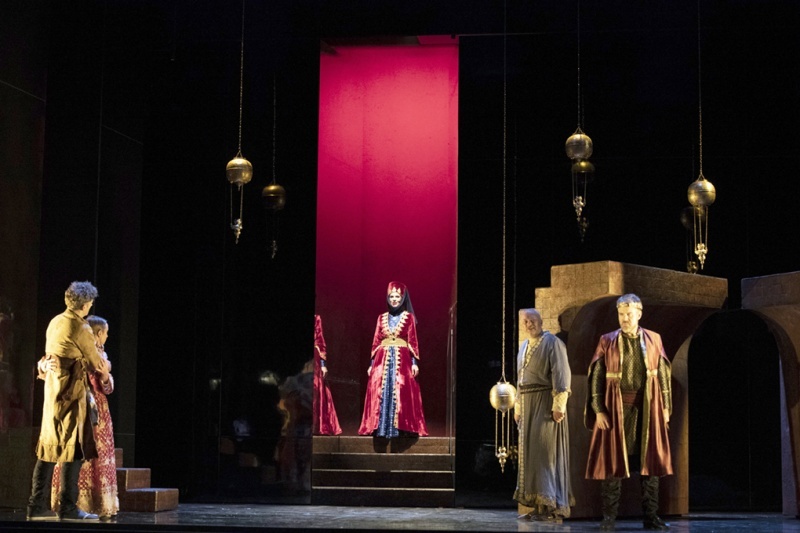
For those of you for whom (like me) this old work is a new acquaintance the 1st century CE plot (from Tacitus) takes a little untangling. Radamisto (beautifully sung as a counter tenor by William Towers) is the son of Farasamane, King of Thrace (Andrew Slater) who has been ousted by the ruthless, Tiridates, King of Armenia. Radamisto’s sister, Polissena (Ellie Laugharne) is the wife of said Tiridates who in his turn has developed a fatal and all consuming desire for Zenobia (Katie Bray) wife of the eponymous son. Into the mix is thrown Tigrane (John-Colyn Gyeantey) Tiridates main man who suffers from an unrequited love for Polissena. Tiridates decides to free Farasamane in exchange for Zenobia and sends Tigrane to make the offer. However Zenobia thinks Tiridates is a loathsome beast and would rather kill herself than have anything to do with him. In fact she tries to do just that and throws herself off a cliff only to land in the river below from where she is rescued and taken back to the palace.
Tiridates, his sexual lust unsatisfied, turns to some displacement activity in the form of blood lust and goes on the rampage losing the plot completely. However, Tigrane, despite being unlucky in love has a thorough dislike of tyrants and puts an end to Tiridates’ rampage by leading a popular rebellion.
Meanwhile, with Zenobia back in his clutches Tiridates decides he is not going to take ‘no’ for an answer and is just about to commit more beastliness when he is interrupted by Polissena and Farasamane. Coincidentally, Radamisto, in disguise, has found his way into Tiridates’ court, only to have his cover blown by some loose talk from his father. Just when Tiridates thinks he has the upper hand again Polissena brings news of Tigrane’s coup. However, instead of exacting revenge the good guys offer to reinstate Tiridates. He is forgiven by his wife, who has loved him throughout, and vows to rule beneficently for the rest of his days. Order is restored along with his sanity and against all the odds he regains the plot.
The opera is clearly driven by a strong moral purpose: the corrupting influence of absolute power on the one hand and the constancy and regenerative power of love on the other. The music is a delight with what I take to be an authentic sound from the Old Street Band under Peter Whelan (at the harpsichord).
It is notable that the strongest characters in the opera are the two women. Neither are cowed by their position as women in a male dominated and violent society. Both are vivid portrayals with fine acting and notable singing from Ms.Laugharne and Ms. Bray. Each exhibits a riveting vocal and physical poise providing a core and focus to the ever swirling plot.
Despite the at times melodramatic and slightly creaky plot, this is a lovely production. James Whelan has resisted the temptation to sensationalise allowing the sequence of solo arias to develop the characters, each of who spend much of the time singing about love in one way or another and who could find issue with that when the music is by Handel? ★★★★☆
Graham Wyles 13th November 2018
Photo by Richard Hubert Smith

